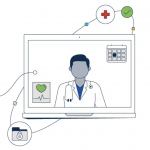Follow along with our new blog series #HealthcareNow and #PublicSectorNow, where we’ll address healthcare innovation around the world and how to maintain business continuity in today’s health climate.
Let’s be honest: COVID-19 has landed a pretty hard hit on our collective mental health. We have valid reasons to be optimistic (more on that in a minute), but the pandemic has brought the issues into focus like never before.
It’s timely. The end of May brings Mental Health Awareness Month to a close in the United States. Only a few weeks ago, we marked Mental Health Week here in Canada. But no matter where you are around the world, there’s no question that at this exact moment, the conversation around mental health has never been more relevant, serious and important.
Forced social isolation has had a huge impact on peoples’ mental health. For those who were already vulnerable, it’s thrown a new barrier between their challenges and the support that’s available. Add all the other ingredients into the equation – financial uncertainty, anxiety over housing, concerns about the health of loved ones – and the situation has put pressure on peoples’ mental health on a scale we haven’t seen in our lifetimes.
Breaking through
At Cisco, we’ve been watching it closely, because we care about mental health – we have a strong track record building public awareness, breaking stigma and supporting employees in need. Since the pandemic started, we’ve gone a step further, holding conversations about our workforce’s mental health at all levels, on a daily basis.
Most importantly for the growing public mental health challenge, though, are the efforts we’ve made outside Cisco – specifically, a recent breakthrough thanks to our partnership with the Centre for Addiction and Mental Health (CAMH).
Headquartered in the heart of downtown Toronto, Ontario, CAMH delivers crucial support to local patients in the fourth-largest city in North America. Starting in September 2018, a group from Cisco Canada has been working with CAMH on delivering virtual care to patients securely over our Webex platform. The goal has been simple: enhance virtual care so that more patients – regardless of their location – can access critical mental health services.
Over the last two years, we’ve developed and tested five proof of concept programs and invested nearly $2-million worth of technology, funding and services in CAMH. The concepts were showing strong results and we’d made significant progress.
And then the pandemic hit – and everything changed. Face to face appointments became a risk to both clinician and patient health and safety. CAMH needed to pivot immediately to meet the needs of its existing patient base.
Thankfully, the foundation laid for the proof of concepts became a springboard, allowing us to rapidly launch a digital transformation.
Scaling telehealth services with CAMH
Working together, CAMH and Cisco seamlessly integrated Webex into the clinical team’s workflow in less than a week.
By mid-March, Webex had been deployed across the organization, enabling the training of upwards of 350 CAMH clinicians – from 50 in February – to deliver virtual care and 1,500 more virtual visits in April.
Webex – along with another legacy telehealth network operated by the provincial government – has helped CAMH deliver a dramatic increase in virtual care visits. From March to April 2020 alone, CAMH’s virtual care visits increased from approximately 350 per month to almost 3,000 per month, an increase of over 750%.
The outcome has been tremendous.
For patients – many of whom are becoming increasingly familiar with technology-based services –Webex gives them more flexibility scheduling appointments and follow-ups, shorter wait times, seamless communication with clinicians and the possibility to receive care no matter where they live.
For CAMH, the impact has been transformational. They’d long seen the huge potential of expanding virtual care to ensure wider accessibility of mental health services, and the results speak for themselves.
At Cisco, we’re proud of the results – but we’re keeping our eyes on the horizon. The end of COVID-19 isn’t in sight just yet, after all. We’ve realized the potential of virtual mental health care and proven we can harness the power of technology to help people get critical care when they need it most. I’m optimistic we can help even more. So, let’s keep the conversation on mental health going, so that we can help each other through today and solve even bigger challenges tomorrow.
Read more about Cisco’s partnership with the Centre for Addition and Mental Health.
Get more information on Cisco’s expertise in telehealth and virtual mental health care.
We’d love to hear what you think. Comment below and stay tuned for the next blog in our #HealthcareNow series.




Rola, mental health patients need counselling, sleep and a job. The last thing that they need are medications that tinkers with the chemicals in the brain. Counsellors with knowledge in financial management, social science, theology and history are probably the best guide.
Thank you Rola, for championing Mental Health. With all the exposure and education available, sadly there are many, who still have difficulty accepting it as a Health issue, leaving many to suffer in silence. There is a need to better understand the new normal Social Media has become and help our children learn to deal with the ‘Perfect’ world that is (mis)presented to them, making them feel insecure, vulnerable and ashamed of who they are and how they look. COV-ID isolation has not helped. Please keep speaking out.